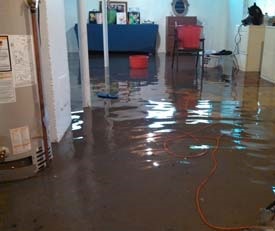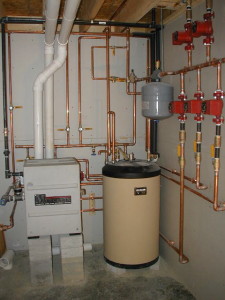Crucial Procedures for Residential Property Owners Facing Problems with Broken Hot Water Systems
This ResourceAlmost everyone maintains their own individual way of thinking about What Do You Do When Your Water Heater Bursts?.

Whether it is situated in the basement or a separate area, damaged water heating units can cause stress. Having no warm water supply is also troublesome.
Call the Plumber
After doing the first 2 safety and security steps, you have to call your plumber to find as soon as possible to take care of a ruptured hot water heater. Nonetheless, bear in mind that your system will not just collapse considerably overnight. There are normally signs that your aging hot water heater has debris buildup in the inside. Remember of the following:
Don't wait on major flooding to call the plumber. By then, you will certainly need to spend more to recover your residential or commercial property. Rather, as soon as you spot these signs, have a professional come to check your water heater storage tank. Commonly, water heaters have a life-span of about 8 to 12 years. With regular evaluation and maintenance, you can lengthen its life.
Cut Off the Cold Water Supply
Cut off the tanks tap water supply from the source. This goes from your main water line into the container. When your container is in good condition, the cold water stops filling out when the tank is full. But given that it is leaking, the water will continue to stream. Shut the shutoff located on top of the heater. Rotate this clockwise to shut it off. You have to transform off that major water supply line outside your building if you can not locate it or reach it.
Turn Off Power Source
Prior to calling the plumber, closed off a gas water heating system by turning the temperature level dial. This will certainly avoid electrocution, specifically if there is a leakage as water is a conductor. Generally, the heating aspect shuts off when the water strikes a certain temperature.
Tidy up Home
After calling the plumber, file damages by remembering and pictures so you can assert your house owner's insurance. From there, start the prompt clean-up. Take out any type of crucial belongings to prevent more soaking. After that, remove any type of standing water to stop mold and also mold development. If you have a submersible water pump, utilize that to drain the water. Or else, the standard container approach will certainly also function. Try to mop out everything, including baseboards and also wall surfaces. Maintain them running to maintain air flowing if you have an electric follower and also dehumidifier. This will certainly help prevent mold and mildew development.
Bear in mind, if you see any issues with your water heating unit, call the pros right away. You can not take this issue lightly since a defective thermostat can raise water temp to a hazardously high degree, leading to unexpected burns.
After doing the initial 2 security steps, you should call your plumber to come right away to deal with a fractured water heating unit. Instead, as quickly as you detect these indications, have a professional come to evaluate your water heating system storage tank. Before calling the plumber, closed off a gas water heater by transforming the temperature dial. If you have a completely submersible water pump, utilize that to drain the water. Bear in mind, if you observe any concerns with your water heating unit, call the pros right away.
8 REASONS YOUR HOT WATER HEATER IS NOT WORKING & HOW TO FIX
Water Heater Problems & Solutions
Loose or Damaged In-Line Valve
Unlike a water leak near the bottom of your water tank, a water leak on top of your system can be easily fixed. A common cause of water tank leaks includes a loose in-line valve. This is a handle that is located at the top of the water tank that is engineered to activate or deactivate the flow of water. To fix this problem, you will need to secure the nut that holds the ball or in-line valve in its location. If the leak becomes more severe once it is tightened, you will be required to travel to your local hardware store to purchase a new in-line valve for your water heater.
Damaged Pressure Relief Valve
Most types of water heaters are equipped with a pressure relief valve that is engineered to discharge pressure from the water tank when it becomes too high. If this valve on top of your water heater begins to leak, we recommend purchasing a new one online or from your local store. The process of removing and replacing pressure relief valves is not complicated.
No Warm Water
If you have an electric water heater in your home, the most typical cause of a lack of warm water is a broken heating element. Your water heater is equipped with two heating elements that are tasked with heating incoming water in the water tank. Once a heating element begins to malfunction, you will have little to no hot water to use for showering, cleaning, and laundry.
Low Supply of Hot Water
Are you continuously running out of warm water? This issue may be a byproduct of a cracked dip tube. This tube is engineered to push cold water to the base of your water tank to be heated. Once a crack or hole begins to form in the dip tube, the incoming supply of cold water may be released near the top or middle of your tank. As a result, the cold water on top of the tank will be sent to the faucets and showers in your house. This hot water heater problem can only be fixed by replacing the dip tube on your system. Since the process of installing a new dip tube is complex, we recommend calling a certified technician for help.
A low supply of warm water may also be a signal of excess sediment buildup in your water tank. As your water heater reaches the middle of its life cycle, minerals in water including magnesium and calcium will begin to collect at the base of the water tank. As the minerals continue to grow, there will be less room in the water tank to store hot water. To resolve this problem, flush your water heater to remove the excess minerals.
Water is Too Warm or Cold
If the water in your shower feels uncomfortable hot or cold, you can adjust the temperature of your water by changing the settings on your thermostat. Setting the temperature to 120 degrees Fahrenheit may help you save money on your utility bills. This is an excellent temperature to use if you’re worried about scalding or skin irritation. Does this temperature feel too cold? You may also adjust the thermostat to 140 degrees Fahrenheit to make your showers more pleasant. If your hot water heater is not working when you change the temperature, this is an indicator of a broken thermostat. Immediately find a certified plumbing or heating contractor in your area to repair or replace your thermostat.
Low Water Pressure
Low water pressure is not always caused by a malfunctioning water heater. If you live in an older home with smaller water pipes, the flow of water will be restricted prior to reaching our kitchen or bathroom skins. The only way to eliminate this hot water heater problem is to connect new ¾-inch water lines to your system. Another type of problem that may negatively impact your water pressure includes calcium deposits in water pipes.
As magnesium and calcium begin to form in your pipes, the diameter of your water lines will become smaller. As a result, the warm water from your water heater will not be able to travel in an efficient manner to your sinks or appliances. Since the process of replacing water pipes includes removing drywall, an average homeowner that does not have a plumbing license will not be able to fix this hot water heater problem.
https://www.wmhendersoninc.com/blog/8-reasons-your-water-heater-is-not-working-how-to-fix/

I came across that blog entry about Water Heater Repair when looking around the web. Do you know about another individual who is intrigued by the topic? Take a moment to promote it. We recognize the value of reading our article about How to Avoid a Broken Hot Water Heater.
Dial, stress less!